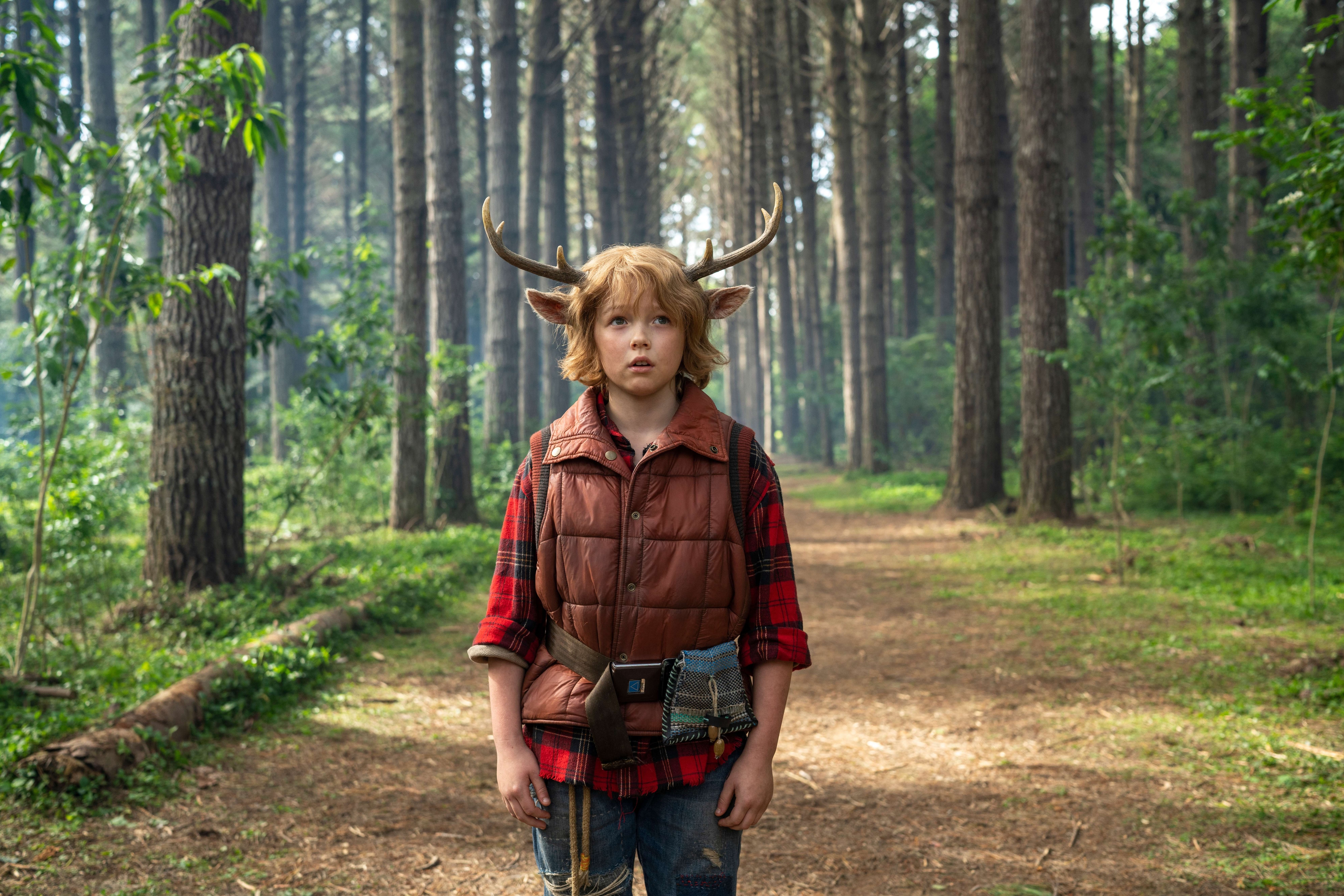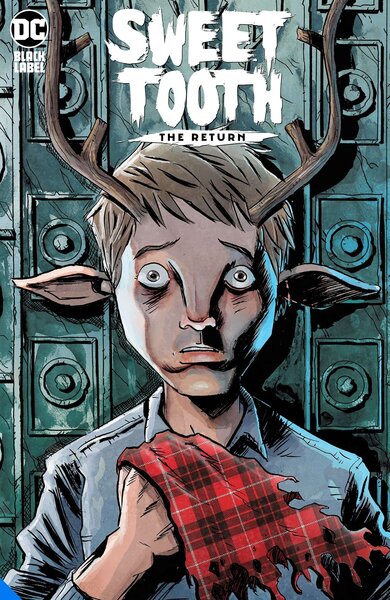Create a free profile to get unlimited access to exclusive videos, sweepstakes, and more!
How Netflix's Sweet Tooth series inspired creator Jeff Lemire to return for a comic sequel

Jeff Lemire is one of the most lauded names today in creator-owned comics. As a writer and artist, he's the mind behind multiple award-winning original titles such as Essex County, Descender, The Nobody, and his beloved Vertigo series from the 2000s, Sweet Tooth.
If there's a throughline for Lemire's stories, it's that they are thoughtful, emotionally resonant, and personal. That means those who connect with his work often become fans for life and deeply protective of what he puts out into the world. And that's why fans of Sweet Tooth, which has been adapted into an eight-episode series for Netflix dropping on June 4, have been nervous about exactly how executive producers Jim Mickle and Susan and Robert Downey Jr. are bringing this special story to life.
Luckily, Jeff Lemire can confirm that he consulted extensively with the executive producers, that they are indeed fans, and he gives their adaptation his sincere blessing. It even inspired him to come back to the series' mythology for the comic's sequel, Sweet Tooth: The Return. SYFY WIRE recently had a long chat with Lemire about the original inspiration for Sweet Tooth, how it's influenced his ongoing creative projects, and the continued potency of Gus' story.
Were you a little filled with more trepidation about how Sweet Tooth would be adapted because it's so personal?
I think anytime you put yourself out there, the way that I try to do with my work, there's always an initial trepidation about who's going to adapt. And what their take on it will be. But to be honest, I had conversations with Jim Mickel, the showrunner, from a very early stage. When he was just thinking about adapting, we had some long conversations. You can get a pretty good read on people pretty quickly, and I kind of knew that Jim was a kindred spirit. A lot of the themes he's interested in, the stories he likes to tell and just him as a human being, he seemed like the right person. Any concerns I had pretty quickly eased.
And for me, any adaptation is going to be different. Obviously, I got to tell the story exactly how I wanted to tell it already. I didn't really have the desire to do it again, and the comic will always be what it is. So it's kind of cool to see someone else come in and to see which elements of what you did resonate with them, and which new things they can bring to it, as well. It's kind of exhilarating, really.
Tell me what was on your mind when Gus became the kernel of an idea that eventually became Sweet Tooth. What was really important for you to be telling in the 40-issue story that it became?
Sometimes it's hard to remember the exact origins of things because stuff happens so organically. I do remember Gus, the character, first appearing in sketchbooks, just as a doodle that kept popping up; this little boy with antlers. I don't know, where or why that appeared, but it kept reappearing. Then the more something like that pops up, the more you start to build a little world or a story around it. Around this time, just looking back at where I was at with my life, my wife and I were expecting our first child; our only child. So, impending parenthood was there. It's easy to see this world as a metaphor for my own fears of this world that my son would grow up in, of course, not knowing he would literally have to navigate a pandemic.
Leaving that aside for a minute, it was to create this larger-than-life fairy tale. Gus — who was actually named after my son, Gus — just embodied hope and everything that's good about humanity and about childhood and innocence and dreams. And then put him in a world that was pretty much the opposite of that, which represented the worst of humanity. It was a cold and threatening place. Then when you create two extremes and put them together, stories naturally come from that. I think all my stories can often go to pretty dark places, but they always generally tend to be stories of hope or resilience. And that's what this story always was. It was just maintaining that spark of hope in the darkest of times. Whatever your fears are, or things you're worried about in your real life, just holding on to some sense of hope. And I guess now more than ever, that's relevant to everyone, but that's what Gus always embodied to me. Every time I go to a convention and do signings, or do sketches for people, everyone wants Gus. It's their favorite and that means something to me too. It resonates, and that means that those characters are still touching people.
Since you are happy with the Netflix adaptation, what additions to your narrative have pleased you the most?
It's been a few things. I think the character and the element they added that I love the most is the character of Aimee Eden (Dania Ramirez), the mother figure to the hybrids that they've added to the world. The actress who plays Aimee is incredible, and it just adds this whole new perspective outside of the Gus/Jepperd dynamic that is such a great contrast and complement to them as well. So that's my favorite element of the stuff that didn't come from the comic that I wish was in the comic in a lot of ways.
You've made a lot of successful original comic book stories that really cover a broad range of topics. Is there a process whereby the ideas come to you?
No, there's no process really. It just sort of happens. It's the stories that you can't let go of. I'll think of ideas all the time and half of them, I don't remember two days later. But then there are certain ones that you do remember, and you start thinking about all the time. It's not a process. I wish there was a process because sometimes you spend months looking for the next thing and you're forcing it and you're doing them just to do them, and they just never really worked out. And then all of a sudden, you'll just see something on the street, or someone will say something in a conversation and it just sparks the next thing. And that's kind of the magic of what I get to do is when it happens, but there's no process for sure. It always comes from an unexpected source or place, I think.
Did your time at Vertigo Comics, writing for Karen Berger, influence your current independent path as a creator-owned maker?
It did set a standard for me. Probably the most influential period of me reading comics was when Vertigo was in its infancy and being born. The years right before and right after Vertigo became Vertigo were super influential. That's when I was in my early to mid-teenage years, so it was really a big part of my life. And then getting the chance to be a part of that legacy with Sweet Tooth was surreal and special. Then getting to become such good friends with Karen over the years is incredibly special.
But I think the things that have stuck with me the most are probably two-fold. The first thing is the friends that I made there, Karen, but also the other creators at the time that were there at Vertigo became this peer group that are still my close friends now. We support each other, and to have that kind of support system for your work is really important. But I think creatively, just the freedom that Karen gave was unheard of in comics at the time, where I created this world and this character. There was never once that she said I couldn't do something. She trusted in me to tell the story I wanted to tell, exactly how I wanted to tell it. And then she, and the editorial staff of Vertigo, were always there to support and be a sounding board when I needed one, but never to interfere and never to dictate. Once you get a taste of that freedom, it's hard to have anything else, so this is why I basically work only for Image Comics now because we have the same freedom. The best editors are the ones who find the right talent and let them do what they do best, which seems like a no-brainer. But it's much rarer than you think, so that's what I took the most from Karen. I think she spoiled me in a good way.
Since you were folded into the Sweet Tooth adaptation conversation, was that the reason you returned to writing new stories in this world?
I never thought I'd do more Sweet Tooth, to be honest. I tend to be the kind of creator that when I'm done with a story, I'm really done. I never reread my work. I'm always immediately on to whatever the next project is, and I focus solely on that. Sweet Tooth was a monthly comic book that I wrote and drew every month for three and a half years, so it was exhausting for us all. When I was done, I was done. And I was really proud of the ending of the series. Maybe more than any other book, it's probably my favorite ending. So I never had the need or desire to revisit it.
But I think the real clincher for me was I went to the set of the pilot shoot in New Zealand for the show. Seeing this crew of hundreds of people in love with this world that I created and lovingly trying to bring it to life, excited about the themes and the character in the story — it kind of shakes you out of your own head a bit and makes you appreciate what you created. And I just started looking for ways back in, like how could I do something that didn't ruin the ending of the original, but complemented it, which is where I landed on the take that I came up with. Although, there were a few false starts, where there was a more direct sequel that felt like this is going to undo what I did. It did take a while to get the idea to jump ahead, as far as I did into the future world. And then, the weirdest part was that I started Sweet Tooth: The Return maybe two months before the pandemic hit, so I was left doing this story during the pandemic in the darkest and most scary parts of that, when we all were very uncertain about what it was gonna be. In a weird way, having this world that was familiar, and these characters that were old friends that I was revisiting was sort of the most comforting thing I could have had. No matter what else was going on in my family, or my life during those days, the hours that I could get into the book and just escape into it was really comforting. It ended up being a great thing for me. And hopefully, that will be reflected in the story.
Were you always finite with how many issues you were going to do for Sweet Tooth: The Return?
I wanted a beginning, a middle, and an end — a nice thing that could complement the series. The length was always the length. I'm sure the story changed because of what was happening. It's hard to know how, but I think it became even more about hope than it probably was originally going to be. My original ending might have been a bit darker than what ended up happening in the books.
Are you content that Sweet Tooth is going to be found by some audiences solely as a TV series?
The goal with any of this stuff is to reach people and try to communicate something to people out there. As much as I'm by myself creating the work every day, if people weren't reading it, it wouldn't mean much. So any way that people can find my work, I'm happy. And if this allows a bigger window, or a bigger gateway for that, fantastic. If people watch the show and never read the book, I think that's okay, too. Because some of what I've done is certainly there and it will get through to them that way. And hopefully, it leads to more people reading the comic. And then it's a win for everyone.



























